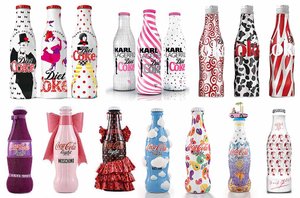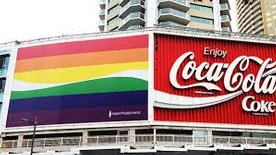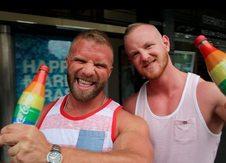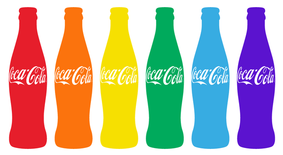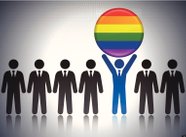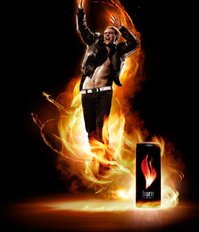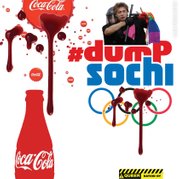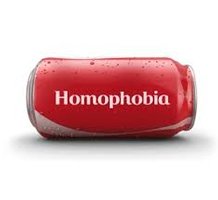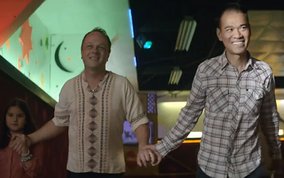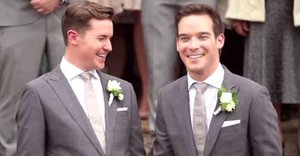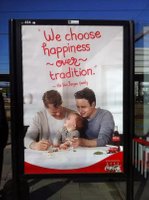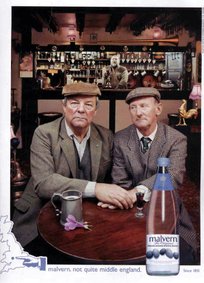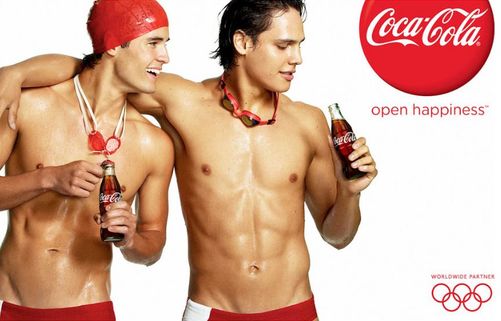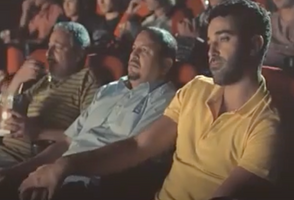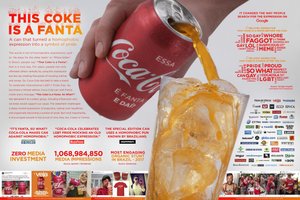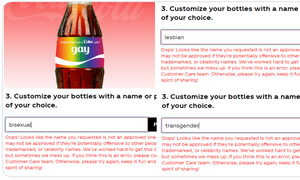© 2021 BRIGHT Marketing Solutions
Marketing the Rainbow
Click on pictures for larger image.
Introduction
Market leader - in a $80 billion industry in the US alone - Coca-Cola has a long tradition of inclusive marketing and diversity, maybe starting in 1971 with "I'd Like to Teach the World to Sing" in the groundbreaking "Hilltop" television commercial. It portrayed a multicultural collection of teenagers on top of a hill appearing to sing the song. There was no sign of LGBT yet, but this was introduced over the years, both in mainstream advertising, as well as directly targeted at the community.
They were one of the first US companies to support the proposed Employment Non-Discrimination Act, which would protect employees from discrimination due to sexual orientation, and its HR department has funded an LGBT employees association since 2000. They earned a perfect score on the Human Rights Campaign's Corporate Equality Index since the index launched in 2006.
On the other hand, while company claims to be “one of the world’s most inclusive brands”, since 2016 it has made 28 donations to 23 American politicians who hold anti-LGBT+ positions, according to Corporate Accountability Action.
To diet or not to diet
After competitor Pepsi had already decided in 2004 to offer Diet Pepsi to the gays, Diet Coke joined them in the gay media in 2007. Of course, this version of the beverage was already marketed with scantily clad hunks, which became famous, such as the Diet Coke Break guy ('95), a more dressed Office Delivery Man ('97), the Window Washer ('98), Elevator ('07) and the Sexy Gardener ('13, celebrating 30 years of Diet Coke), which became viral hits - but these ads were primarily aimed at women. There even was a parody in 2018.
To appeal to the seemingly perpetually health-conscious gay market, the Diet Coke ads asking the question, "Sparkling or Sparkling?" ran in Instinct magazine, along with a contest to walk the red carpet of the Oscars which Coke also sponsored. Gay consumers are "big drinkers of Diet Coke and big followers of the Oscars," noted Susan McDermott, spokeswoman for Coca-Cola. "It's an audience we've always been aware of for the brand," she notes. "During the Oscars media buy, we asked, 'Who are we missing?' " They realized the answer was gay consumers.
J.R. Pratts, publisher of Instinct magazine, which now had both the brands as advertisers, said, "We've been pursuing them for years and were calling them every once in a while. I remember when we got the Diet Pepsi buy, we all celebrated," recalled Pratts. "We figured we'd opened the category, we'll see if we can get more soft drink brands. I'm very bullish."
Burn!
In Poland, Coca-Cola introduced Burn energy drink through gay publications, including Replika and Ayor, gay web sites, and as the sponsor of LGBT party events in gay clubs. Trying to be funny, the same brand had a commercial in Italy, where a Don Giovanni leaves a trace of satisfied lovers, concluding with an effeminate man, giving 'Don' a confused look on his face.
In Italy Burn there was a funny ad for Burn, which revealed the secret for a bachelor's (?) stamina. Rumor has it that this commercial was never aired...
2013: Celebrity spottings
In 2013 Diet Coke featured gay fashion designer Marc Jacobs, who also designed a number of cans for the brand - like (gay) predecessors Jean-Paul Gaultier did in 2012 and Karl Lagerfeld in 2011.
2014: Olympic troubles
Inspite of their good ratings, like the HRC index, Coke still suffered protests for its sponsorship of the 2014 Winter Olympics in Sochi, which were darkened by controversy, largely due to Russia's anti-gay laws. Major sponsors Coca-Cola and McDonald’s were among those who saw their promotional efforts on social media virtually hijacked by gay rights activists who demanded that they drop their support of the games in light of the unstable social situation in Russia, as well as for the safety of incoming Olympic athletes of the LGBT community. A campaign by SumOfUs.org garnered over 450,000 signatures, urging Coke to speak up.
Things reached a boiling point when Olympic security guards in uniforms showing the Coke logo detained an on-looker that was waving a rainbow flag during the Olympic Torch relay. While McDonald’s had to sit back and watch as its “Cheers To Sochi” social campaign was taken over by activists (and subsequently ‘killed’ by McDonald’s), Coca-Cola decided not to remain silent.
Gay awards bosses for The Out in the City and G3 Magazine Awards in the UK chucked Coca-Cola off their shortlist after refusal to speak out on LGBTI rights in Russia. They had nominated Coca-Cola in its Brand of the Year category for what are dubbed ‘Britain’s gay Oscars’.
2014: A case of OOPS...
After the launch of the “Share a Coke” campaign in South Africa in 2014, in which you could personalize a virtual can of Coke, the company was called out for preventing users from typing words associated with homosexuality. Among the banned list of words in the campaign - including f*ck, sex, homo, and dyke - users were also prohibited from entering the word gay. If you typed in that word, you got the message “Oops, let’s pretend you didn’t just try that.” The same thing happened if you tried to type the word “homo” - yet typing “straight” and “hetero” both worked in the promotional tool. In response to the massive push back on social media, Coca-Cola released a formal apology addressing the promotion and subsequent backlash from the LGBT community. This included "This isn’t how the program was supposed to work, and we’ve pulled the site down until we can fix the problem. We apologize for this mistake. As one of the world’s most inclusive brands, we value and celebrate diversity. We have long been a strong supporter of the LGBT community and have advocated for inclusion, equality and diversity through both our policies and practices. When errors like this happen, we take it seriously. Thank you for raising this with us, and we’ll get it fixed."
However, in 2021 they made the exact same mistake again (see below).
2014: Super Bowl diversity
But that was an incident at most. On the other hand, “professional lesbian” Jenn T. Grace described Coca-Cola’s 2014 Super Bowl commercial - marked by NBC as “Coke features first gay family to appear in a Super Bowl ad” - as one of the best examples of “Inclusion based marketing”. Over 111 million people watched it, and the gay couple (with kid) in there was not noticed by many, as it was included as-a-matter-of-factly among many others situations that reflected the diversity of American society.
The commercial aired on Feb. 2, 2014, during Super Bowl XLVIII, and five days later during the opening ceremony of the Winter Olympics. The music underneath the pictures was America The Beautiful (the songwriter being Katherine Lee Bates, a lesbian), sung in different languages. You can imagine the protests that erupted about all the blasphemy that Coca-Cola poured out over the American people. About the languages. Nobody seemed to notice the gay seconds, though.
Campaigns like Coca-Cola’s are “a step forward for the advertising industry,” said Sarah Kate Ellis, president and chief executive of GLAAD, which has long promoted diversity and inclusion in the media, and “a reflection of the growing majority of Americans who proudly support their LGBT friends, family and neighbors.”
2014: Reasons to believe
Later that year they sparked some controversy again with the ‘Reason to Believe’ campaign. While the commercial in most European markets showed multiple images of happy moments in life, including a same-sex couple getting married, in the version that was shown in Ireland the gay couple was replaced by a beautiful inter-racial couple. At that time civil partnership for gay people was legal in Ireland, but gay marriage was not.
To include the gay wedding was a bold decision of sorts, replacing it was bound to get reactions. Gay-rights advocates claimed that the brand was backing out from its support to same-sex marriage, thus implying that Coke is “ashamed of the LGBT community”. A bit of a storm in a teacup, if you ask me. They had already wholeheartedly supported the battle for equality in the US before, and partnered with the Human Rights Campaign as well.
In 2015, the company placed billboards in the Netherlands, as part of their campaign #choosehappiness, showing the “Van Bergen family” - consisting of two fathers and a child, stating “We choose happiness over tradition”.
Support
In the course of the past 15 years, they have made a few huge mistakes, but at the same time have both supported the community, as well as targeted them with their advertising, and via sponsoring - such as the Mardi Gras in Sydney, where the landmark billboard in King's Cross was coupled with a rainbow of equal proportions and a (very late) a statement against the controversial 'religious freedom' bills in the US. After the historical SCOTUS verdict, they were one of the first to rejoice on social media (picture on the right).
Malvern
Part of the Coca-Cola group (in the Schweppes division) until they closed their plant in 2010, Malvern Mineral Water used an unusual image of two elderly men holding hands in an English pub to demonstrate that their product was unusual too. However, it was not used to target the gay market and as such was not gay marketing.
Note: Malvern Water is fit for queens. Queen Elizabeth I drank it in public in the 16th century; Queen Victoria refused to travel without it, and it is the only bottled water used by Queen Elizabeth II, which she took on her travels around the world.
Corporate policy
Their corporate website states: "Coca-Cola is proud of its history of supporting and including the LGBTQI community in the workplace, in its advertising and in communities throughout the world. From supporting pride parades to running rainbow-colored billboards, Coca-Cola has demonstrated its commitment to protecting employees from discrimination based on sexual orientation, gender identity and expression.
Recent examples include:
- 2004: The company created an employee LGBTQA (Lesbian, Gay, Bisexual, Transgender, Questioning, Ally) Business Resource Group to foster a culture of equality and inclusiveness.
- 2011: The company began offering transgender-inclusive health insurance coverage in the U.S.
- 2015: Coca-Cola began assisting with the costs of taxes imposed on eligible U.S. employees whose same-sex spouse or partner was enrolled in health benefits and who lived in states that did not recognize same-sex marriage.
- 2017: The company implemented a paid parental leave policy which extends to same sex couples in the U.S.
- 2017: The company added gender identification and expression protection language to its Global Human Rights Policy
- 2020: Coca-Cola Italia was named the most inclusive company in that country by receiving the Diversity Brand Award.
As Coca-Cola strives to serve as a champion business and the community, it recognizes its responsibility to be vocal when it comes to diversity and inclusion. Yes, Coca-Cola is a beverage company. But it's also a company that cares about human rights – about people from all different backgrounds and walks of life. On May 17 and every day, Coca-Cola salutes its LGBT+ associates, consumers, customers, friends and family.
This article was last updated Dec 27, 2021
2010: Egypt
For the 2010 FIFA World Cup in Egypt, Coke ran the commercial "Cinema". This ad is one in a series where Coca-Cola promoted bottles with a twist-off cap. Each ad has the Coke drinker using someone else's hand to open the bottle, and in each one the person whose hand is used ends up disappointed. So what is the older man's "disappointment" in the cinema? When the younger man shakes his head, does he mean "No, you can't share my Coca-Cola" or "No, you can't have sex with me?" The answer is left to the viewer's imagination. This ambiguity is what makes the ad intriguing. The homoeroticism is there for anyone who wants to see it but it's deniable (well, almost) if anyone complains.
2018: This Coke is a Fanta
In support of international LGBT+ pride day, Coca-Cola launched a limited-edition can in Brazil. A red Coke can with orange Fanta inside, featuring the message: This Coke is a Fanta. So what? The first meaning was "the outside doesn’t match the inside", but underneath sat the homophobic slur.
In Brazil, one of the most famous expressions is “Essa Coca é Fanta” or “That Coke is a Fanta”. For years, this expression was used to make fun of the LGBT+ community in the country. This special can ignored labels, challenged prejudice and empowered people. Showing that there’s nothing wrong about a Coke being a Fanta, the iconic cans carrying this simple message were intentionally designed to become a statement for the fight against prejudice.
The campaign flooded people’s social media timelines, took over the streets with people making their own DIY Coca/Fanta bottles, carnival costumes, clothes, and cellphone covers to transform this expression into a symbol for Coke and Brazilians to fight prejudice.
Entirely organically, the campaign delivered 1 billion (!) media impressions with US $0 media spend and changed the biggest search on Google history for the term, turning it into an expression of empowerment and pride. The campaign won gold at the Cannes Lions 2018.
2018: Coke Zero and the gay pride
In the UK, an old man in a nursing home tries the soda for his first time, then wonders what else he hasn’t tried. To the Queen tune, “I Want to Break Free,” he goes on a series of fantastic events, including appearing shirtless in a gay pride parade in a Roman gladiator costume. Cluelessly, he asks another, “Where are all the ladies?”
Marriage equality
For the first time in 131 years, Coca-Cola using its iconic Spencerian script for something other than its logo. This was in response to Australia’s postal survey on marriage equality. Coca-Cola Australia launched a limited-edition Coke can featuring the world LOVE in Coca-Cola’s celebrated font, complete with two hearts – one rainbow filled.
“The word ‘love’ is reflective of our core values. If ever we were to experiment with Spencerian script, this is the time to do it,” said James Sommerville, Coca-Cola VP of global design, who helped conceptualize these cans. It was an extension of the company’s statement, “No matter who you are or who you love, all couples should be treated equally.”
Conclusion
Although there were a few minor hiccups, Coke has been a long time player in Marketing the Rainbow, and most often successfully so. A perfect score on the Human Rights Campaign's Corporate Equality Index since 2006. Groundbreaking Super Bowl commercials, special campaigns in support of LGBT causes, word jokes and playful imagery. I give them a 7/10.
You would have thought Coke learned from their 2014 mistake with the discriminatory personalization of their products. However, in 2021 they just dit it all over again. Their new online customisation tool let people personalise the glass bottles with their own bespoke labels, including an option with the Pride flag. So far, so good. But for some reason the word “lesbian” was banned, while users were able to use anti-trans slurs, as well as words like “Cock suckers,” “Trump Won,” and briefly, “Nazis.”. The message on the site read: “Oops! Looks like the name you requested is not an approved one. Names may not be approved if they’re potentially offensive to other people, trademarked, or celebrity names. We’ve worked hard to get this list right, but sometimes we mess up.”
You could, however, customise the bottle to read “gay,” “transgender” and “bisexual” – although not on the Australian site. A rather random set of do's and dont's...
The ads Coke released as an Olympic sponsor may have looked like part of their Marketing the Rainbow, but were in fact just shots of bonding ahtletes.
2021 Pride blooper
Case study: Coca-Cola
from the Diet Coke Break guy to Olympic troubles
